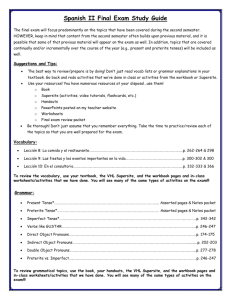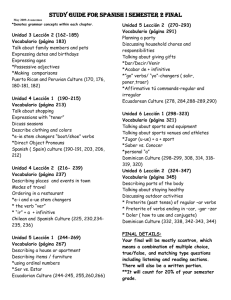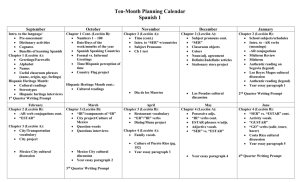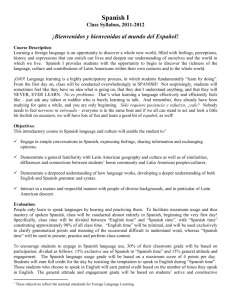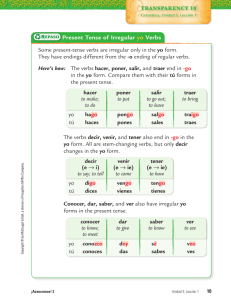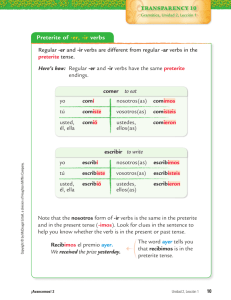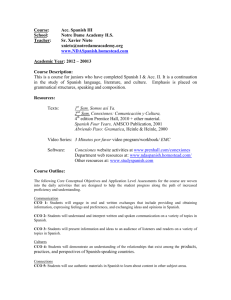Spanish 1 Syllabus 07
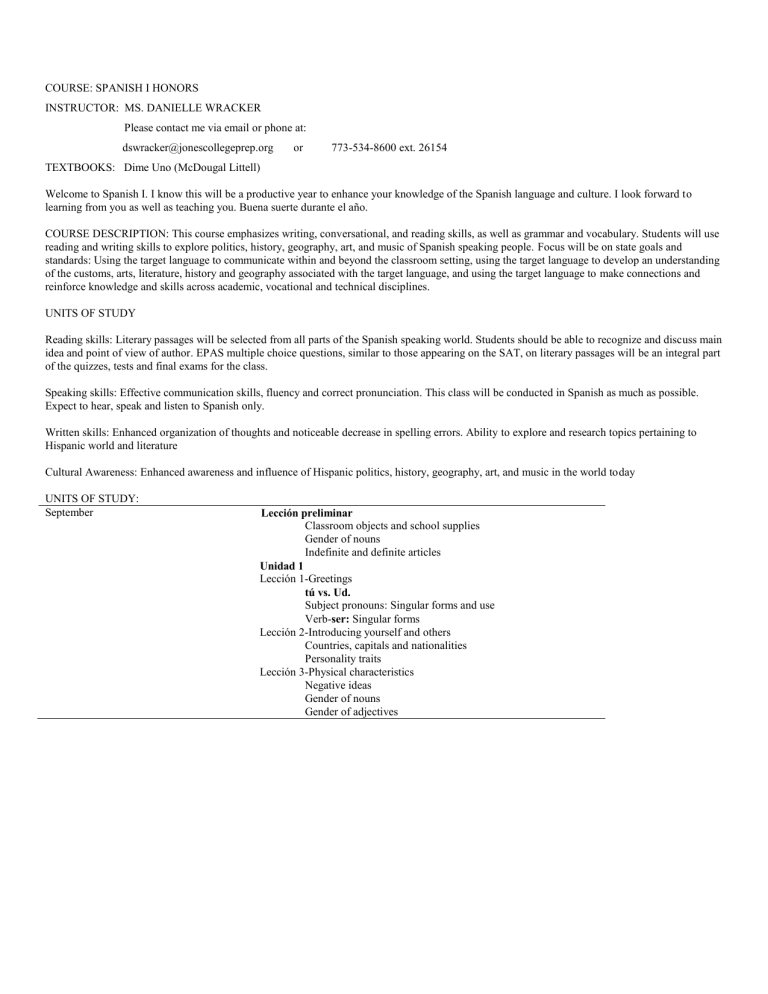
COURSE: SPANISH I HONORS
INSTRUCTOR: MS. DANIELLE WRACKER
Please contact me via email or phone at:
dswracker@jonescollegeprep.org or 773-534-8600 ext. 26154
TEXTBOOKS: Dime Uno (McDougal Littell)
Welcome to Spanish I. I know this will be a productive year to enhance your knowledge of the Spanish language and culture. I look forward to learning from you as well as teaching you. Buena suerte durante el año.
COURSE DESCRIPTION: This course emphasizes writing, conversational, and reading skills, as well as grammar and vocabulary. Students will use reading and writing skills to explore politics, history, geography, art, and music of Spanish speaking people. Focus will be on state goals and standards: Using the target language to communicate within and beyond the classroom setting, using the target language to develop an understanding of the customs, arts, literature, history and geography associated with the target language, and using the target language to make connections and reinforce knowledge and skills across academic, vocational and technical disciplines.
UNITS OF STUDY
Reading skills: Literary passages will be selected from all parts of the Spanish speaking world. Students should be able to recognize and discuss main idea and point of view of author. EPAS multiple choice questions, similar to those appearing on the SAT, on literary passages will be an integral part of the quizzes, tests and final exams for the class.
Speaking skills: Effective communication skills, fluency and correct pronunciation. This class will be conducted in Spanish as much as possible.
Expect to hear, speak and listen to Spanish only.
Written skills: Enhanced organization of thoughts and noticeable decrease in spelling errors. Ability to explore and research topics pertaining to
Hispanic world and literature
Cultural Awareness: Enhanced awareness and influence of Hispanic politics, history, geography, art, and music in the world today
UNITS OF STUDY:
September Lección preliminar
Classroom objects and school supplies
Gender of nouns
Indefinite and definite articles
Unidad 1
Lección 1-Greetings tú vs. Ud.
Subject pronouns: Singular forms and use
Verbser: Singular forms
Lección 2-Introducing yourself and others
Countries, capitals and nationalities
Personality traits
Lección 3-Physical characteristics
Negative ideas
Gender of nouns
Gender of adjectives
October
November
December
January
Unidad 2
Lección 1-Class schedules
Telling time
Phone numbers
Numbers 0-30
Nouns and definite articles
Verbtener: Singular forms
Lección 2-Describing people, places and things
Giving location of people and things
Adjectives
Subject pronouns: Singular and plural forms
Verbsestar and ser
Lección 3-After school activities
Future activities and obligations
Pastimes
Infinitives
Ir and ir a + infinitive
Tener and tener que
Unidad 3
Lección 1-Giving information about destination
Expressing likes and dislikes
Making polite requests
Ir a
Indefinite article and hay
Gustar and encantar
Lección 2-Discussing weekend activities
Season and weather expressions
Present tense: Singular forms
Lección 3-Describing and inquiring about everyday activities
Present tense: Plural forms
Indefinite and negative words
Unidad 4
Lección 1-Identifying and describing family members
Asking about birthdays and age
Possessive adjectives
Numbers from 30-100
Months of the year
Lección 2-Identifying family members by remarriage
Asking about people you know or want to meet
Expressing what you want to be in the future
Asking people about their professional goals
Asking questions
Personal a
Verbsconocer, querer, and venir
Questions and question words
Unidad 4
Lección 3-Describing how people feel
Describing what is happening at the moment
Estar with adjectives
Present progressive and –ndo verb forms
2
February Unidad 5
Lección 1-Describing location
Asking for and giving directions
Ordering people to do something
Exchanging money
Affirmative tú commands: Regular forms
Numbers: 100-1.000.000
Verbssaber, salir, dar
Lección 2-Expressing preferences
Making a purchase
Describing clothing
Gustar and encantar
Stem-changing verbs: e-ie and o-ue
Ordinal numbers
Lección 3-Naming snack food
Ordering a snack
Taking an order at a café
Stem-changing verbs e-i
Tener idioms
Indirect object pronouns
3
March
April
May
June
Unidad 6
Lección 1-Describing what you and others did during the day
Preterite tense: Regular verbs
Preterite of ir
Lección 2-Extending an invitation
Accepting and declining an invitation
Describing a trip
Preterite of hacer, ser, dar, and ver
Lección 3-Describing a series of events in past time
Discussing Indian cultures of Mexico
Preterite of poder, tener, venir and decir
Unidad 7
Lección 1-Exchanging information about sports
Pointing out specific people and things
Demonstratives
Spelling changes in the preterite
Lección 2-Giving information about people’s physical condition
Giving and following orders
Describing what happened in the past
Direct object pronouns
Stem-changing verbs in the preterite: e-i and o-u
Lección 3-Giving and understanding orders
Giving the location of things
Affirmative tú commands: Irregular forms
Prepositions of location
Unidad 8
Lección 1-Describing daily routines
Describing how things are done
Naming foods
Reflexive pronouns and verbs
Adverbs
Lección 2-Naming and describing rooms in a house
Expressing extremes
Making comparisons
Preterite of estar
Absolute superlatives: -ísimo
Comparatives
Lección 3-Describing what is happening at the moment
Telling what you usually do
Describing something that happened
Present tense: A summary
Present progressive: Summary
Preterite tense: Summary
Review for Final Exam
4
National Spanish Examination Specifications for Vocabulary
World
Leisure Time
Family and Home
School and
Education
Travel and
Transportation
Meeting personal needs
World of Work
Level 1
· cardinal points (north, south, east, west)
· simple geographical divisions (continent, country, city)
· names of 21 Spanish-speaking countries and their capitals
· nature and the environment (basic words plants and animals)
· days of the week
· months of the year and dates
· basic weather expressions
· telling time and basic time divisions
· simple pastimes and basic sports
· simple description of people
· basic temporary states
· simple physical characteristics and basic personality traits
· simple description of things and basic colors
· immediate family
· basic parts of the house
· basic educational words
· basic items found in the classroom
· basic mathematical operations
· simple places in a city
· basic directions
· basic travel expressions: air travel and train travel
· common greetings and farewells
· basic expressions of courtesy
· basic introductions
· expressing likes and dislikes
· basic food expressions
· basic clothing
· basic parts of the body
· basic work expressions
· basic professions
5
Nouns and articles
National Spanish Examination
Specifications for Grammar
Level 1
· gender and number of nouns ending in -o, -a
· diminutive ending - ito
· possession of nouns (use of de + noun to express 's)
· definite articles (el, la, los, las)
· use of definite article with a title
· use of definite article with days of the week to express "on"
· contractions with "al" and "del"
· indefinite articles (un, una, unos, unas)
Adjectives
· gender and number
· position
· short form possessive
· ordinal numbers 1st - 10 th
· cardinal numbers 1 - 100
Verbs
· subject- verb agreement
· present tense
· negation
· ser vs. estar
· idiomatic uses of tener = to be (calor, hambre, años)
· helping verbs: tener que, poder, querer
· hacer used in weather expressions
· present progressive
· expressing the future with "ir + a + infinitive"
Adverbs
Pronouns
Prepositions
Conjunctions
Interjections
Other
· adverbs of affirmation (sí, cómo no, por supuesto)
· adverbs of negation (no, nada)
· adverbs of time (tarde, siempre, ahora, hoy)
· adverbs of place (aquí, allí)
· subject
· direct object
· indirect object (used with gustar)
· simple prepositions (de, a, en, con, para, sin, según, entre)
· personal a
· simple conjuctions (y, o)
· simple interjections (¡Ay!, ¡Oye!,)
· question words
· word order of questions
6
TECHNOLOGY: Computers, software, Internet sites, accompanying VCR tapes, overheads, and audio cassettes will be used to support the curriculum.
Language Lab
Jones College Prep
Rules and Procedures
The World Language Department feels fortunate to be able to offer to our students state-of-the-art technology in foreign language learning that is available in the Language Lab. As users of the Language Lab we must work together to keep the equipment, furnishings and facilities in excellent condition as they exist today. Students are asked to do the following:
1.
Take assigned seats. Bags, books, belongings are to be left along cabinets, or as directed by teachers.
2.
Refrain from tampering with computer, mouse, keyboard, headphones or furnishings. Keep feet on the floor so as to not damage furniture. Computer screens should only be changed as directed by your teacher.
3.
Keep computer screens and settings as they are.
4.
Refrain from placing foreign objects in the disk drive or touching the screen with fingers, pen, pencil or other object.
5.
Remain seated and at your assigned station when wearing headphones. Headphones are to remain connected at all times. Students are to hang headphones when finished working.
6.
Check the carrel and the equipment before using it. Report any irregularities to the teacher. Any damage due to vandalism will be attributed to the last student at that station.
7.
Stay with the task assigned by the teacher.
8.
Refrain from bringing food, drink, candy, or gum to the Language Lab.
9.
At the end of the period, properly log off the computer. The computers are to be left on unless otherwise directed by the teacher.
10.
Students who are absent may be asked to make up lab work before or after school.
11.
Please leave your workstation in good order. Make sure paper is picked up and chairs are pushed in.
Inability to follow these procedures could result in removal from the station and a “0” for the assignment, detention, parent calls, and referral to Ms.
Moody.
NOTE: Students who are caught vandalizing, sabotaging, or breaking in their computer station, any other computer station, or attempting or gaining unauthorized access to resources will be referred to Mrs. Newsome, and are subject to being denied technology access.
COURSE OUTLINE AND OBJECTIVES:
1. Use Spanish inside and outside of the classroom.
2. Use Spanish to develop an understanding of Hispanic culture.
3. Use Spanish to make connections and reinforce knowledge and skills across academic, vocational and technical disciplines.
REQUIRED MATERIALS: Folder or binder specifically used for Spanish assignments, loose-leaf notebook paper, pencil, pen, Spanish/English dictionary (recommended), spiral notebook or journal, textbooks and workbooks (all previously mentioned materials should be brought to class every day), various materials for projects as required and announced
CLASSROOM RULES: Students must be aware of the importance of remaining on task because of the impact of behavior on learning. Respect for self, other students and the teacher is imperative to insure success for everyone in the classroom. The correct atmosphere creates assurance for higher achievement and grades.
1. Food in cafeteria only
2. Drink in cafeteria only
3. Gum in cafeteria only
4. Cell phones outside of classroom only
5. Have books everyday
6. Sit in assigned seat
7. Violation of any of the above will result in being written up for detention and I will make a call to parent/guardian
Consult the student handbook for other behavioral expectations
Loss of textbook will result in mandatory replacement fee.
7
COURSE EXPECTATIONS, POLICIES AND PROCEDURES:
Any student caught cheating on a test or quiz, or cutting class on the day of a test or quiz, will receive a 0 grade on the test or quiz. An assignment missed because of an excused absence must be turned in the day following the student’s return. It is the student's responsibility to obtain the work given during the absence. Cutting class merits a 0 grade on the assignment to be handed in that day.
All students are expected to be respectful to everyone in the classroom at all times. All students should be seated and ready to participate in class when the bell rings. To speak or ask for help, students are expected to raise their hands.
Opportunity for extra credit points will be added to the majority of quizzes and tests. All students are encouraged to attempt all extra credit. Various other extra credit opportunities in the form of project or extra assignments will present themselves during the semester.
Students will be successful in Spanish if they;
1.
Learn each day's work as it is presented;
2.
Memorize the definition and correctly spell the vocabulary;
3.
Come prepared to learn; and
4.
Improve writing skills to teacher’s approval.
TESTS AND MAJOR ASSIGNMENTS: All tests and major assignments will be announced at least one week in advance on the homework website.
LATE WORK: For full credit, homework and assignments must be turned in on the designated day. Work will not be accepted after it is one week late. For everyday that work is late, 5 points will be deducted.
EVALUATION: Grading Scale:
A=95-100%
B=88-94%
C=81-87%
D=75-80%
F=74% and below
Weight of Class Activities:
10%-Final Exam10%-Final Exam-Will cover material from entire semester. There will be a multiple choice section, a reading section and a writing section.
22.5%-Quizzes and Tests (oral and auditory quizzes)
22.5%-Daily homework assignment
22.5%-Projects, Workbook Pages, Written Essays, Group Dialogues
22.5%-Bellringers and Class Participation
Sign below indicating receipt and understanding of syllabus.
_________________________________________
Student signature
___________________________________________
Parent/Guardian signature
8
